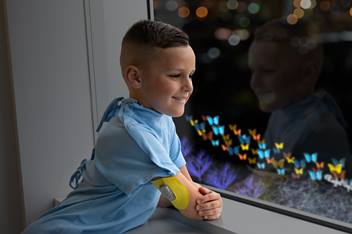Name: Finley
Condition(s):
- Extreme Prematurity
Specialty(s):
Age at Treatment: Birth
Age Today: 2 Years
Meet Finley

Where are they now?
Catching up with Finley one year later.
Finley has made great strides since we first featured her story one year ago. Born at 22 weeks, she faced many complications as she joined Nationwide Children's Hospital’s population of smallest patients. She has since been cleared from the bone clinic after bone density scans showed great improvement and she no longer needs oxygen support.
Finley is meeting milestone after milestone for both her adjusted age and actual age. She is caught up in height and weight and has begun signing and speaking. She has even learned to say “mama,” melting her mother’s heart. “She is truly a miracle, and we are all so proud of her,” Finley’s mom shares.
Finley was born with a fighting spirit. She was also born at only 22 weeks, making her birth extremely premature. It’s rare that a baby born this early even survives.
A birth is considered premature when it occurs before 37 weeks of pregnancy (gestation) have been completed, and a birth is considered extremely premature if it occurs before 28 weeks of gestation. The earlier a baby is born, the more problems they face, and in cases of extreme prematurity, critical organs may not be developed enough to keep a baby alive without intensive medical care. Premature children also face a higher risk of serious medical issues later in life.
When Finley was born, she weighed only 600 grams, or just a little over one pound.
“She was so small, and she had wires everywhere,” her mother, Andrea, recalls. “I remember looking at her and she wasn’t how I expected her to look. I expected her to look worse than what she did based off pictures I had seen. She was still so tiny.” She remembers a moment after Finley was born where the medical team was having issues putting in a tube to help Finley breathe (intubating). They told Andrea that if they couldn’t do it, they would bring Finley over to lay on her chest. However, they were able to intubate her, and Andrea knew they had a fighting chance.
And fight she has. Today, Finley is six months old and, after months of care and treatment, Andrea knows their battle is not yet over. Finley has long-term complications of Bronchopulmonary Dysplasia (BPD). BPD causes long-term breathing (respiratory) problems, that required respiratory support throughout her hospital stay and after she was discharged from the NICU. She was recently weaned from supplemental oxygen and is doing fantastic. Nationwide Children’s Hospital neurology and nephrology teams will continue to see Finley based on two brain bleeds she suffered and to make sure her ventricles do not enlarge. Finley will also receive treatment for osteoporosis to ensure that her bones grow stronger. The team will also closely monitor Finley’s developmental milestones and her elevated risk for cerebral palsy. While things have been difficult, Finley’s mom is thankful that it was not worse and, in the grand scheme of things, thinks Finley is doing great.
The care Finley received in the Small Baby Program at Nationwide Children’s helped improve her outcome, just as it has improved the outcomes of many other babies born extremely premature. The Small Baby Program uses a dedicated approach to care that embraces the needs of both the premature baby and the family. As a result, premature babies at Nationwide Children’s are doing more than surviving. They’re thriving.
“I have nothing but good things to say about our care team,” Andrea says. “I feel like they explained everything well, even in the beginning when there might be a prognosis that was grim.”
Research and technology are vital to stories like Finley’s. In 2021, preterm birth affected about one of every 10 infants born in the United States and the preterm birth rate rose 4% in 2021, from 10.1% in 2020. Just 10 years ago, the survival rate for babies like Finley was only 10%. Today, the survival rate is 78%.
This holiday season, when you donate to Nationwide Children’s, you will light up the hospital lawn with glowing butterflies for patients to see and in doing so, light up their life. When a gift is made, butterflies will illuminate across the front lawn of the main hospital. Help put a light on research and best outcomes for children everywhere this holiday season.




